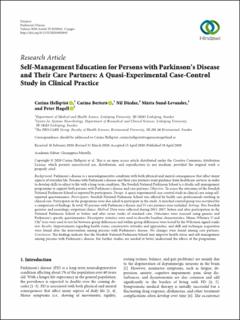| dc.contributor.author | Hellqvist, Carina | |
| dc.contributor.author | Berterö, Carina | |
| dc.contributor.author | Dizdar, Nil | |
| dc.contributor.author | Sund-Levander, Märta | |
| dc.contributor.author | Hagell, Peter | |
| dc.date.accessioned | 2020-07-07T10:18:58Z | |
| dc.date.available | 2020-07-07T10:18:58Z | |
| dc.date.issued | 2020 | |
| dc.identifier.citation | Hellqvist, C., Berterö, C., Dizdar, N., Sund-Levander, M., & Hagell, P. (2020). Self-Management Education for Persons with Parkinson’s Disease and Their Care Partners: A Quasi-Experimental Case-Control Study in Clinical Practice. Parkinson's Disease, 2020, 6920943. | en_US |
| dc.identifier.uri | https://hdl.handle.net/11250/2660951 | |
| dc.description.abstract | Background. Parkinson’s disease is a neurodegenerative condition with both physical and mental consequences that affect many aspects of everyday life. Persons with Parkinson’s disease and their care partners want guidance from healthcare services in order to develop skills to adjust to life with a long-term condition. The Swedish National Parkinson School is a dyadic self-management programme to support both persons with Parkinson’s disease and care partners. Objective. To assess the outcomes of the Swedish National Parkinson School as reported by participants. Design. A quasi-experimental case-control study in clinical care using self-reported questionnaires. Participants. Swedish National Parkinson School was offered by health care professionals working in clinical care. Participants in the programme were also asked to participate in the study. A matched control group was recruited for a comparison of findings. In total, 92 persons with Parkinson’s disease and 55 care partners were included. Settings. Five Swedish geriatric and neurologic outpatient clinics. Method. Data were collected during 2015–2017, before and after participation in the National Parkinson School or before and after seven weeks of standard care. Outcomes were assessed using generic and Parkinson’s specific questionnaires. Descriptive statistics were used to describe baseline characteristics. Mann–Whitney U and Chi2 tests were used to test for between-group differences and within-group differences were tested by the Wilcoxon signed-ranks test. Results. Improvements regarding health status, constructive attitudes and approaches, and skill and technique acquisition were found after the intervention among persons with Parkinson’s disease. No changes were found among care partners. Conclusion. The findings indicate that the Swedish National Parkinson School may improve health status and self-management among persons with Parkinson’s disease, but further studies are needed to better understand the effects of the programme. | en_US |
| dc.publisher | Parkinson’s Disease | en_US |
| dc.rights | Navngivelse 4.0 Internasjonal | * |
| dc.rights.uri | http://creativecommons.org/licenses/by/4.0/deed.no | * |
| dc.subject | self-management education | en_US |
| dc.subject | Parkinson's disease | en_US |
| dc.subject | care partners | en_US |
| dc.subject | Parkinsons sykdom | en_US |
| dc.subject | nevrologiske lidelser | en_US |
| dc.title | Self-Management Education for Persons with Parkinson’s Disease and Their Care Partners: A Quasi-Experimental Case-Control Study in Clinical Practice | en_US |
| dc.type | Journal article | en_US |
| dc.source.pagenumber | 6920943 | en_US |
| dc.source.volume | 2020 | en_US |
| dc.source.journal | Parkinson’s Disease | en_US |
| dc.identifier.doi | https://doi.org/10.1155/2020/6920943 | |

